If you're dealing with acne on black skin, you've likely encountered challenges like hyperpigmentation and scarring. Natural remedies can offer a gentler approach to treating these issues without harsh chemicals. While there's no one-size-fits-all solution, certain ingredients have shown promise in combating acne and improving skin health for darker complexions. From the antibacterial properties of tea tree oil to the soothing effects of aloe vera, these natural alternatives may be the key to achieving clearer, more radiant skin. But before you start experimenting, it's essential to understand how each remedy works and which ones are best suited for your specific skin concerns.
Key Takeaways
- Tea tree oil offers antibacterial and anti-inflammatory benefits, less likely to cause hyperpigmentation in black skin.
- Aloe vera soothes irritation and reduces redness, while combating acne-causing bacteria.
- Turmeric's curcumin provides potent anti-inflammatory and antioxidant effects, improving skin clarity with consistent use.
- African black soap, rich in vitamins A and E, gently cleanses and moisturizes while fading acne scars.
- Neem oil reduces hyperpigmentation, balances oil production, and exhibits antibacterial properties beneficial for acne-prone black skin.
Tea Tree Oil
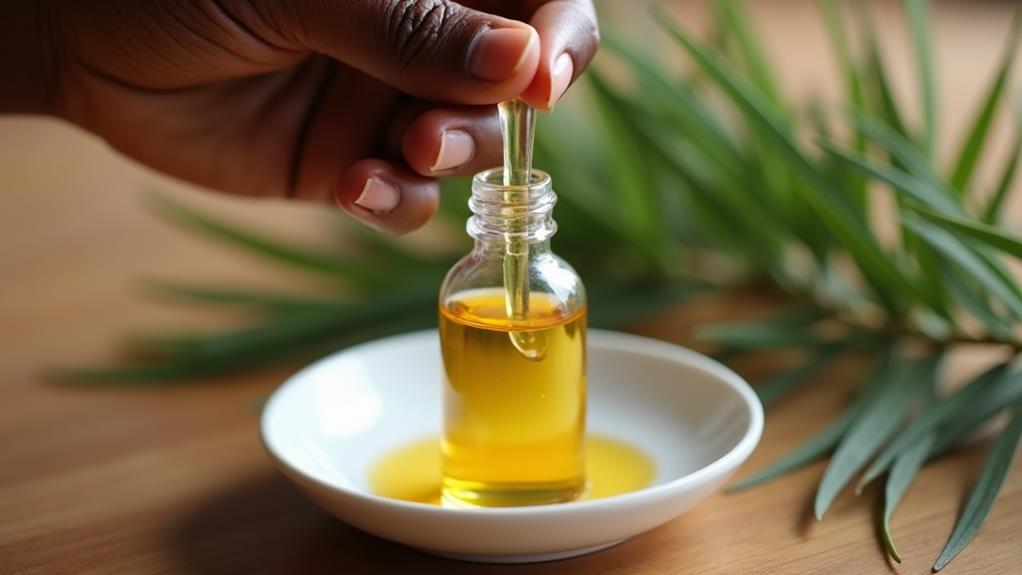
Although many people turn to harsh chemicals for acne treatment, tea tree oil offers a gentler alternative for black skin. This essential oil, derived from the leaves of the Australian tea tree, boasts powerful antibacterial and anti-inflammatory properties. These qualities make it effective in fighting acne-causing bacteria and reducing redness and swelling associated with breakouts.
To use tea tree oil for acne, you'll need to dilute it with a carrier oil like jojoba or coconut oil. Mix one to two drops of tea tree oil with 12 drops of carrier oil, then apply the mixture to affected areas using a cotton swab. You can do this once or twice daily, but be sure to patch test first to check for any adverse reactions.
Tea tree oil is particularly beneficial for black skin because it's less likely to cause hyperpigmentation or scarring compared to harsher treatments. It's also effective in reducing excess oil production, which can help prevent future breakouts.
However, it's essential to recognize that while tea tree oil is generally safe, some people may experience irritation. If you notice any burning or excessive dryness, discontinue use and consult a dermatologist.
Aloe Vera
Harnessing the power of nature, aloe vera stands out as another effective remedy for acne in black skin. This succulent plant contains compounds with anti-inflammatory and antibacterial properties, making it an excellent choice for treating acne and reducing post-inflammatory hyperpigmentation.
To use aloe vera, you'll want to extract the gel directly from a fresh leaf or purchase a pure aloe vera gel. Apply a thin layer to your cleansed face, focusing on acne-prone areas. Let it sit for 15-20 minutes before rinsing off with cool water. You can repeat this process daily or as needed.
Aloe vera's soothing properties help calm irritated skin and reduce redness, while its natural astringent qualities can help tighten pores and remove excess oil. It's also rich in antioxidants, which protect your skin from free radical damage and promote healing.
For best results, combine aloe vera with other natural ingredients like honey or tea tree oil. Remember to patch test before applying it to your face, as some people may be sensitive to aloe.
With consistent use, you'll likely notice improvements in your skin's texture and overall appearance.
Turmeric
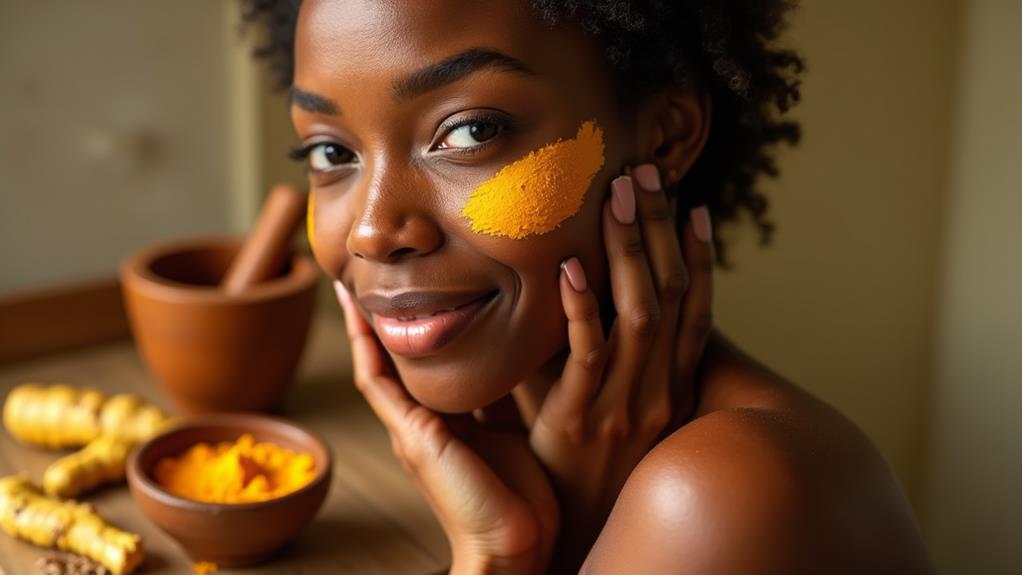
The golden spice turmeric offers a powerful solution for acne in black skin. Its active compound, curcumin, possesses potent anti-inflammatory and antibacterial properties that can help combat acne-causing bacteria and reduce inflammation.
Turmeric also has antioxidant effects, which can protect your skin from free radical damage and promote healing.
To use turmeric for acne, you can create a simple face mask by mixing 1 teaspoon of turmeric powder with 2 tablespoons of plain yogurt or honey. Apply this mixture to your face, leave it on for 15-20 minutes, then rinse off with lukewarm water. You can use this mask 2-3 times a week for best results.
It's important to note that turmeric may temporarily stain your skin yellow, especially if you have lighter skin tones. To minimize this effect, you can add a few drops of lemon juice to your mask or use kasturi turmeric, which is less likely to cause staining.
Always do a patch test before applying turmeric to your face to ascertain you don't have any adverse reactions. With consistent use, you'll likely notice improvements in your skin's clarity and overall health.
Apple Cider Vinegar
Among natural remedies for acne, apple cider vinegar stands out as a potent solution for black skin. Its antibacterial properties help fight acne-causing bacteria, while its acidic nature balances your skin's pH levels.
To use it, dilute one part apple cider vinegar with three parts water, then apply it to your face with a cotton ball.
You'll find that apple cider vinegar's astringent qualities can help reduce excess oil production, which is often a concern for those with black skin. It also contains alpha-hydroxy acids that gently exfoliate dead skin cells, preventing clogged pores and promoting cell turnover.
When using apple cider vinegar, start with a patch test to verify you don't experience any adverse reactions. If your skin tolerates it well, you can gradually increase the concentration.
Remember to moisturize afterward, as the vinegar can be drying. For best results, use this treatment once or twice daily, but discontinue if you notice any irritation.
While apple cider vinegar can be effective, it's not a miracle cure. Combine it with a consistent skincare routine and a healthy diet for ideal acne management in black skin.
Honey
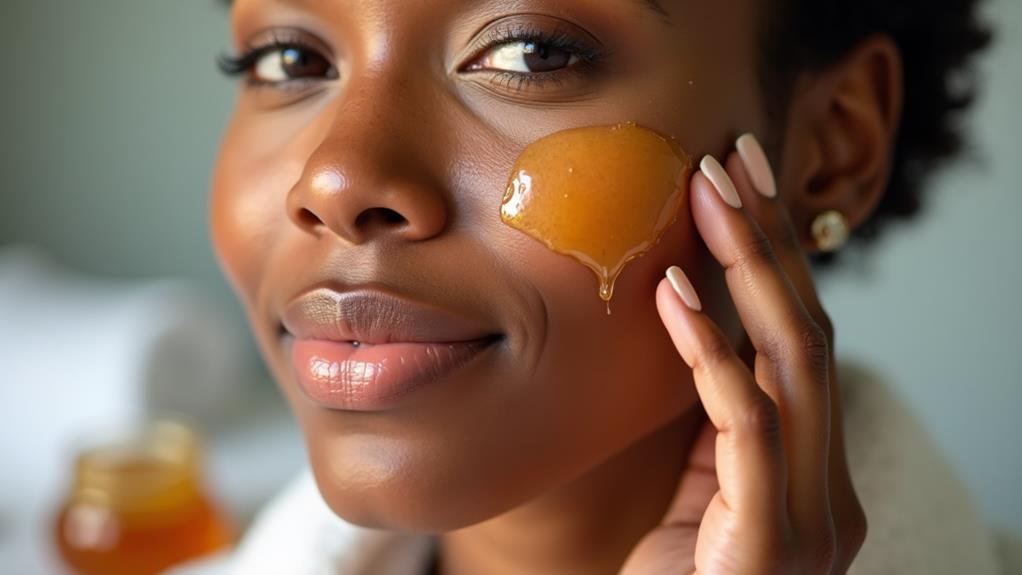
Renowned for its healing properties, honey offers a gentle yet effective approach to treating acne in black skin. It's a natural humectant, drawing moisture to your skin while its antibacterial properties combat acne-causing bacteria. When applied topically, honey can help reduce inflammation and redness associated with breakouts.
To use honey as an acne treatment, start with raw, unprocessed honey. Apply a thin layer to clean skin, focusing on affected areas. Leave it on for 10-15 minutes before rinsing with lukewarm water. You can also create a honey mask by mixing it with other skin-friendly ingredients like cinnamon or turmeric.
For best results, use this treatment 2-3 times a week. Be patient, as natural remedies may take longer to show results compared to chemical treatments. Honey is generally safe for all skin types, but if you have a bee allergy, avoid this remedy.
Remember to patch test before applying it to your face to guarantee you don't have any adverse reactions. Consistency is key when using honey for acne treatment, so incorporate it into your skincare routine regularly for maximum benefits.
Green Tea
Steeped in antioxidants and anti-inflammatory properties, green tea offers a potent natural remedy for acne in black skin. Its high concentration of polyphenols, particularly epigallocatechin gallate (EGCG), helps combat the bacteria that cause acne while reducing inflammation and redness.
To harness green tea's benefits, you can apply it topically or consume it as a beverage. For topical use, brew a strong cup of green tea, let it cool, and apply it to your face with a cotton ball. Leave it on for 10-15 minutes before rinsing. You can also mix green tea leaves with honey to create a mask.
Drinking green tea regularly can help improve your skin from within. Aim for 2-3 cups daily to maximize its effects. The antioxidants in green tea can help protect your skin from free radical damage and reduce sebum production, which is often excessive in acne-prone skin.
For best results, choose organic, high-quality green tea. You'll find that incorporating green tea into your skincare routine can lead to clearer, healthier-looking skin over time.
Witch Hazel
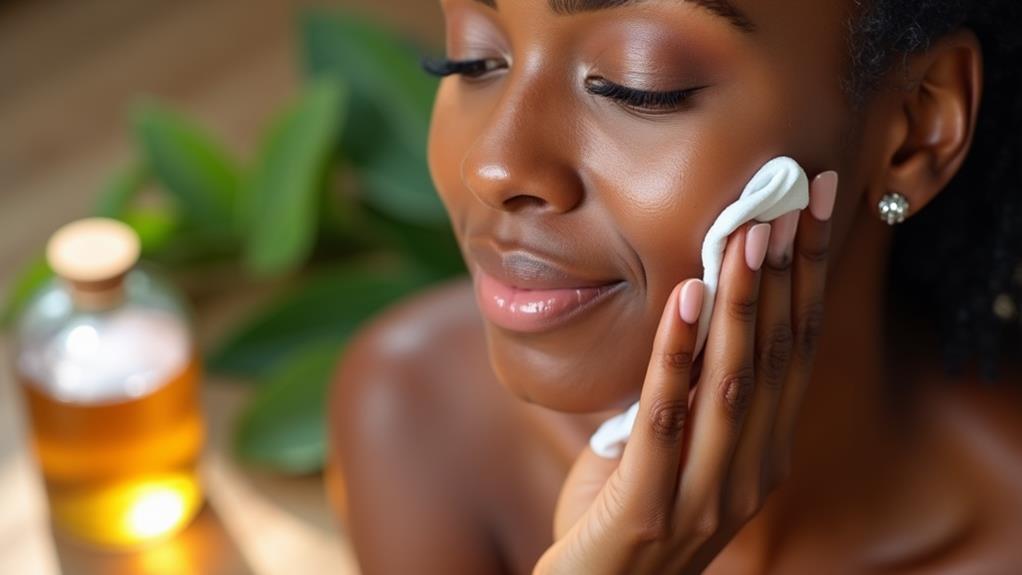
Witch hazel, a natural astringent derived from the bark and leaves of the witch hazel shrub, offers another powerful solution for acne in black skin. This botanical extract has been used for centuries to treat various skin conditions, including acne, due to its anti-inflammatory and antibacterial properties.
When you apply witch hazel to your skin, it helps reduce excess oil production and tighten pores, making it particularly effective for oily and acne-prone skin types. It's also gentle enough for sensitive skin, which is often a concern for those with darker complexions.
To use witch hazel for acne treatment, simply apply it to your face with a cotton ball after cleansing. You can use it as a toner or spot treatment, depending on your needs. For best results, look for alcohol-free witch hazel products to avoid drying out your skin.
While witch hazel can be effective on its own, you can also combine it with other natural ingredients like aloe vera or tea tree oil for enhanced benefits.
Remember to patch test before using it regularly to guarantee you don't have any adverse reactions.
African Black Soap
From the rich traditions of West Africa comes African Black Soap, a natural skincare powerhouse that's particularly effective for treating acne in black skin. This unique soap is made from a blend of plantain skins, cocoa pods, palm tree leaves, and shea tree bark, all of which are roasted and then mixed with water and various oils.
African Black Soap's effectiveness lies in its combination of natural ingredients. It's rich in vitamins A and E, which promote skin healing and reduce inflammation. The soap's natural glycerin content helps moisturize your skin without clogging pores, while its antibacterial properties combat acne-causing bacteria.
When using African Black Soap, you'll notice it's gentler than many commercial acne treatments, making it ideal for sensitive black skin. It helps balance your skin's natural oils, reducing both oiliness and dryness.
The soap also contains natural exfoliants that can help fade acne scars and even out skin tone, a common concern for those with darker skin.
To use, simply lather the soap in your hands and gently massage it onto your face. Rinse thoroughly and follow with a moisturizer suitable for your skin type.
Neem Oil
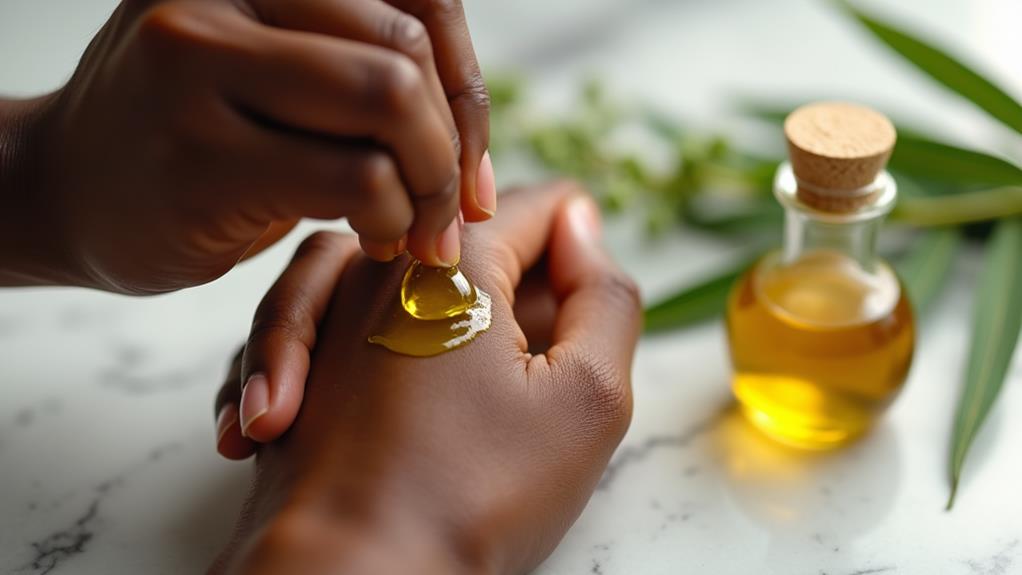
Another powerful natural remedy for acne in black skin is neem oil, derived from the seeds of the neem tree native to the Indian subcontinent. This versatile oil boasts potent antibacterial, antifungal, and anti-inflammatory properties, making it highly effective in treating acne and preventing future breakouts.
To use neem oil for acne, you'll want to dilute it with a carrier oil like jojoba or coconut oil. Mix a few drops of neem oil with your chosen carrier oil and apply it directly to affected areas using a cotton swab. Leave it on overnight and rinse off in the morning. You can also add a few drops to your regular moisturizer for daily use.
Neem oil's benefits extend beyond acne treatment. It can help reduce hyperpigmentation, a common concern for those with black skin, by evening out skin tone and fading dark spots. Additionally, its moisturizing properties can help balance oil production, preventing both dryness and excess sebum.
While neem oil is generally safe for most skin types, it's always best to perform a patch test before applying it to your face. If you experience any irritation, discontinue use and consult a dermatologist.


